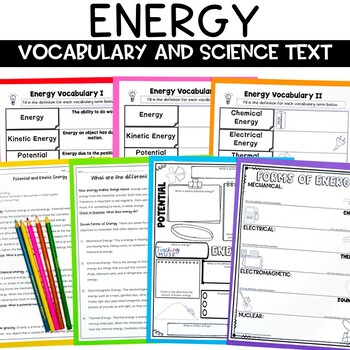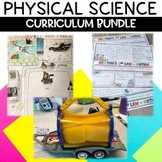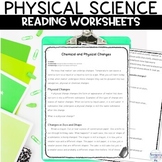Forms of Energy Activity
- PDF
- Google Apps™

What educators are saying
Also included in
- Looking for easy to implement units of study for your physical science curriculum? These activities will help students learn about electricity, magnetism, forms of energy, force and Newton's laws of motion, and simple machines. This curriculum includes science texts, projects, classroom posters, cooPrice $100.00Original Price $117.93Save $17.93
- Cover all topics of your physical science curriculum with these nonfiction reading worksheets on over ten science topics. Students will learn all about the topics such as matter, chemical and physical changes, atoms and elements, electricity, and magnetism through each reading packet. In addition, tPrice $13.20Original Price $16.50Save $3.30
- Teach your students about potential, kinetic, and forms of energy using this energy science unit of vocabulary, science texts, review activities, a project, and assessment to engage all student learning types. Students will learn through visual anchor charts, hands-on demonstrations, inquiry activitPrice $15.74Original Price $22.48Save $6.74
Description
Introduce and support your forms of energy unit using the vocabulary sheets, science texts, and graphic organizers covering potential, kinetic, and 7 forms of energy. In addition to the forms of energy vocabulary terms, the energy science text includes real-life examples, checkpoint, and overall reading comprehension questions to assess student knowledge of these topics. Graphic organizers allow students to review and summarize their learning.
Like this energy activity? Check out the unit and save 20% by clicking here.
Students will learn the following:
- 7 forms of energy
- thermal
- sound
- electromagnetic
- electrical
- mechanical
- chemical
- nuclear
- Potential and kinetic energy
- including gravitational, elastic, and mechanical potential energy
This forms of energy lesson includes:
- 2 Vocabulary worksheets
- Digital link to Google Slide activity
- 2 Science articles on potential and kinetic energy and the 7 forms of energy
- 2 Graphic organizers
- Answer key
How to use this activity:
- Introduce energy to your science students
- Review before an assessment
- Homework assignment
- Sub plans
- Science station
- Additional support for struggling learners
- Independent activity
Feedback from teachers.
- Articles are easy to read and great for comprehension. Questions are embedded in the articles, plus the overall review helps students apply what they learned.
- Great easy resource to use on a day I was out for conferences! Students could work in partners quietly and did not have too many questions.
- First, kudos for putting together a resource that is very age-appropriate looking for middle, school-especially for students in special education. The content and vocabulary are grade-level appropriate. I did read most of this out loud to my students, but they had to use their reading code strategies, such as highlighting while I read to help them find and locate information/answers.
- I use nonfiction text as much as possible to help my students prepare for assessments and future learning environments. I liked these articles; they helped me reinforce a science topic and help them build reading skills.
- Great work to leave for the sub. They still learned so much just from the reading. It was perfectly on their level :)
Like this activity? Check out my bundle of physical science worksheets here!
Other lessons and activities to support your energy unit:
- FREE Choice Activity Worksheet
- Anchor Chart Posters
- Sound Energy and Waves
- Review Game
- Flipbook
- Task Cards
- Color by Number Review Activity
- Poster Project
Kindly Note: If you have questions, do not hesitate to email me at Teaching Muse Email
PLEASE PREVIEW BEFORE PURCHASING
__________________________________________________________________
Thank you for visiting Teaching Muse. I would love for you to become a follower.
Teaching Muse followers receive new product information and discounts on any new items!
__________________________________________________________________
All rights reserved by Teaching Muse. This product is to be used by the original downloader ONLY. Copying for more than one teacher, classroom, department, school, or school system is prohibited. Additionally, this product may not be distributed or displayed digitally for public view. Failure to comply is a copyright infringement and a violation of the Digital Millennium Copyright Act (DMCA). They are intended for classroom and personal use ONLY.








